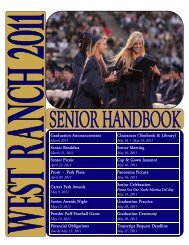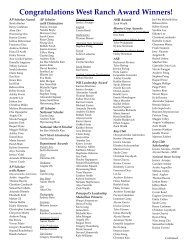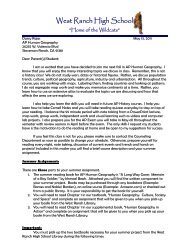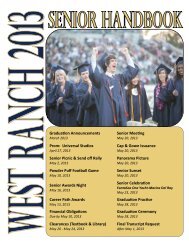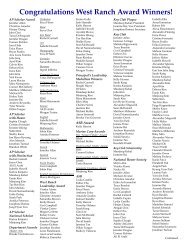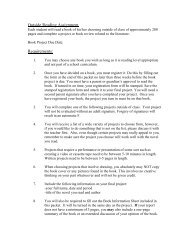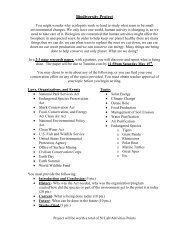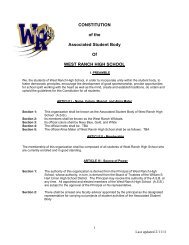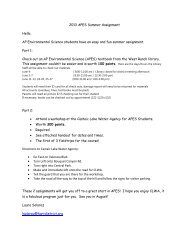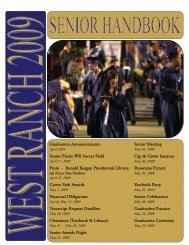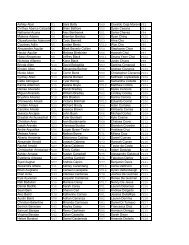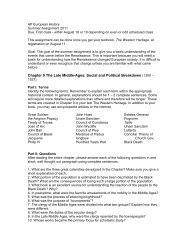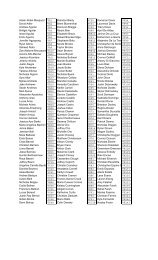ap spanish language summer assignments - West Ranch High School
ap spanish language summer assignments - West Ranch High School
ap spanish language summer assignments - West Ranch High School
Create successful ePaper yourself
Turn your PDF publications into a flip-book with our unique Google optimized e-Paper software.
AP SPANISH LANGUAGE SUMMER ASSIGNMENTS<br />
Rationale for Summer Assignments<br />
¡Felicitaciones! It is commendable that you have chosen to continue your study of Spanish through the<br />
AP level. As you know, the purpose of this course is to have you ready to excel on the AP Spanish<br />
Language Exam, which will be administered in May of 2014. Students enrolled in Advanced Placement<br />
Spanish are required to complete the <strong>summer</strong> assignment prior to the start of class in August. The<br />
<strong>assignments</strong> integrate the use of technology while maintaining the integrity of <strong>language</strong> acquisition<br />
through real-life experiences. Summer <strong>assignments</strong> have been selected to continue the development of<br />
more advanced communication skills in listening, speaking, reading, and writing. These areas are tested<br />
on the AP Spanish Language Exam.<br />
If you have any questions in regards to any of the <strong>assignments</strong>, please contact me at<br />
avalles@hartdistrist.org. I will be checking my e-mail periodically during the <strong>summer</strong>.<br />
This packet will also be available on our school website. It is worth 125 pts.<br />
The following are some recommendations for things to do over the <strong>summer</strong> and during the school year<br />
to help you prepare for the AP exam. These are in addition to your <strong>assignments</strong> and school activities.<br />
1. Every week, read articles in a Spanish publication (People Magazine en español, Hola,<br />
Cosmopolitan en español, etc.; automobile magazines, fashion magazines, and so forth are also<br />
<strong>ap</strong>propriate. It is always easier to read something that interests you.)<br />
2.You can go on the Internet and read articles in Spanish such as on-line newsp<strong>ap</strong>ers, magazines, and<br />
websites. Many search engines are available in Spanish. If you click on or type “video” at<br />
www.Yahoo.com or www.Google.com, you can find videos in Spanish that will help with visual, audio<br />
and gestures in Spanish.<br />
3.If you have cable television, watch Univisión, Telemundo, or other Spanish programming daily. We<br />
recommend watching news programs such as “Primer Impacto,” or “Noticiero.” You will see and<br />
hear people from different Spanish-speaking countries. “Tu Desayuno Alegre,” is a morning talk show<br />
with music videos. Telenovelas, (so<strong>ap</strong> operas) are available and easy to follow.<br />
4.Videos and DVDs are excellent resources, too, for listening to Spanish. While watching your favorite<br />
DVD this <strong>summer</strong>, select to hear or watch your DVD in the Spanish <strong>language</strong>. Watch the program and<br />
jot down some words or things you don’t understand or want to learn then. You probably will not<br />
understand everything, but over time your understanding will increase. Another option is to t<strong>ap</strong>e a show,<br />
then pick a 3-5 minute segment and keep rewinding it, working with it until you get most of what is<br />
going on. You might like working with music videos or commercials when you do this at first.<br />
5.Go to www.study<strong>spanish</strong>.com and complete the free practice activities. You will never be expected<br />
to pay for any activities or registration- ONLY do the free activities, quizzes, and tests-the test results<br />
will automatically give you feed back. Remember: This is only a recommendation! You are coming into<br />
the course already knowing all the content, so use this opportunity to refine your skills.
Helpful Websites / Resources<br />
The following sites are easily accessed. They provide direct links to television, radio, and<br />
newsp<strong>ap</strong>ers from many locations throughout the Spanish-speaking world.<br />
www.telemundo.com<br />
http://www.prensaescrita.com/<br />
http://broadcast-live.com/television/<strong>spanish</strong>.html<br />
http://broadcast-live.com/latinamerica.html<br />
www.bbcmundo.com/<br />
www.elpais.es<br />
www.thep<strong>ap</strong>erboy.com<br />
The following sites offer support for writing in Spanish. Rules for punctuation, c<strong>ap</strong>italization, etc.<br />
are included here along with helpful vocabulary lists.<br />
http://<strong>spanish</strong>.about.com/od/written<strong>spanish</strong>/Write_in_Spanish.htm<br />
http://www.<strong>spanish</strong>.sbc.edu/writing_guide.html<br />
http://www.fsu.edu/~modlang/sp-cai/coursesite/LetterVocab.htm<br />
Revistas (magazines):<br />
http://www.vanidades.com/<br />
http://www.hola.com/<br />
http://www.cosmohispano.com/<br />
http://www.elle.es/<br />
http://www.peopleenespanol.com/pespanol/<br />
http://espndeportes.espn.go.com/?cc=3888<br />
Advanced Placement Spanish / Required Assignments<br />
Activity #1 (20pts)<br />
Write two journal entries reflecting on current events of the Spanish-speaking world. Use the online<br />
news sites, BBC and CNN en español. You may find an article on one of the Internet sites listed under<br />
resources or from a traditional printed source such as a newsp<strong>ap</strong>er or magazine. (The links are below.)<br />
Attach the article or provide the URL address. Answer the questions in complete sentences and write 5<br />
new vocabulary words with English definition.<br />
http://www.bbc.co.uk/mundo/<br />
http://mexico.cnn.com/
Current Event #1<br />
Attach article or the URL address here:<br />
Example: http://www.bbc.co.uk/mundo/ultimas_noticias/<br />
Fecha: _________________________________________________________________<br />
Título del artículo:________________________________________________________<br />
¿De qué o quién se trata? ___________________________________________________<br />
_______________________________________________________________________<br />
¿Qué pasó? ______________________________________________________________<br />
¿Dónde ocurrió? __________________________________________________________<br />
¿Cuándo ocurrió?_________________________________________________________<br />
¿Por qué es importante esta información? (o ¿por qué es interesante?)<br />
____________________________________________________________________________________<br />
____________________________________________________________________________________<br />
____________________________________________________________________________________<br />
Vocabulario Nuevo<br />
1.<br />
2.<br />
3.<br />
4.<br />
5.
Current Event #2<br />
Attach article or the URL address here:<br />
Example: http://www.bbc.co.uk/mundo/ultimas_noticias/<br />
Fecha: _________________________________________________________________<br />
Título del artículo:________________________________________________________<br />
¿De quién qué trata? ______________________________________________________<br />
_______________________________________________________________________<br />
¿Qué pasó? ______________________________________________________________<br />
¿Dónde ocurrió? __________________________________________________________<br />
¿Cuándo ocurrió?_________________________________________________________<br />
¿Por qué es importante esta información? (o ¿por qué es interesante?)<br />
____________________________________________________________________________________<br />
____________________________________________________________________________________<br />
____________________________________________________________________________________<br />
Vocabulario Nuevo<br />
1.<br />
2.<br />
3.<br />
4.<br />
5.
Activity #2 (80 pts)<br />
You will need to watch 4 hours of Spanish television, but it should be something of educational value with a lot of <strong>language</strong><br />
use such as a news program. You may also fulfill this requirement by watching online pod casts of news etc. Then document<br />
it with a summary of 4-6 sentences in Spanish. Do not forget to document the web page, radio name, etc. See log attached<br />
they are eight 30 minute logs. Start now!<br />
Vary the type of material you listen to. For example: listen to things related to the environment, politics, economics, tourism,<br />
etc. At the beginning it may be hard to understand the first time so you may listen to it more than once, take notes, etc. You<br />
can listen for 15 minutes at a time, if that is easier.<br />
TV / RADIO / PODCAST LOG<br />
FECHA: ______________________________________________<br />
SELECCIONAR (Circle) one: TV RADIO PODCAST<br />
NOMBRE DEL PROGRAMA:______________________________________________<br />
HORA:________________________________________(30 minutes)_______________________<br />
RESUMEN/COMENTARIOS<br />
____________________________________________________________________________________<br />
____________________________________________________________________________________<br />
____________________________________________________________________________________<br />
____________________________________________________________________________________<br />
____________________________________________________________________________________<br />
____________________________________________________________________________________<br />
TV / RADIO / PODCAST LOG<br />
FECHA: ______________________________________________<br />
SELECCIONAR (Circle) one: TV RADIO PODCAST<br />
NOMBRE DEL PROGRAMA:______________________________________________<br />
HORA: ______________________________________________(30 minutes)_________________<br />
RESUMEN/COMENTARIOS<br />
____________________________________________________________________________________<br />
____________________________________________________________________________________<br />
____________________________________________________________________________________<br />
____________________________________________________________________________________<br />
____________________________________________________________________________________<br />
___________________________________________________________________________________________
TV / RADIO / PODCAST LOG<br />
FECHA: ______________________________________________<br />
SELECCIONAR (Circle) 1: TV RADIO PODCAST<br />
NOMBRE DEL PROGRAMA:______________________________________________<br />
HORA:________________________________________________(30 minutes)_______________<br />
RESUMEN/COMENTARIOS<br />
___________________________________________________________________________________________<br />
___________________________________________________________________________________________<br />
___________________________________________________________________________________________<br />
___________________________________________________________________________________________<br />
___________________________________________________________________________________________<br />
___________________________________________________________________________________________<br />
TV / RADIO / PODCAST LOG<br />
FECHA: ______________________________________________<br />
SELECCIONAR (Circle) one: TV RADIO PODCAST<br />
NOMBRE DEL PROGRAMA:______________________________________________<br />
HORA:_________________________________________________(30 minutes)______________<br />
RESUMEN/COMENTARIOS<br />
___________________________________________________________________________________________<br />
___________________________________________________________________________________________<br />
___________________________________________________________________________________________<br />
___________________________________________________________________________________________<br />
___________________________________________________________________________________________<br />
___________________________________________________________________________________________<br />
TV / RADIO / PODCAST LOG<br />
FECHA: ______________________________________________<br />
SELECCIONAR (Circle) one: TV RADIO PODCAST<br />
NOMBRE DEL PROGRAMA:______________________________________________<br />
HORA:_________________________________________________(30 minutes)______________<br />
RESUMEN/COMENTARIOS<br />
___________________________________________________________________________________________<br />
___________________________________________________________________________________________<br />
___________________________________________________________________________________________<br />
___________________________________________________________________________________________<br />
___________________________________________________________________________________________
TV / RADIO / PODCAST LOG<br />
FECHA: ______________________________________________<br />
SELECCIONAR (Circle) 1: TV RADIO PODCAST<br />
NOMBRE DEL PROGRAMA:______________________________________________<br />
HORA:__________________________________________(30 minutes)_____________________<br />
RESUMEN/COMENTARIOS<br />
____________________________________________________________________________________<br />
____________________________________________________________________________________<br />
____________________________________________________________________________________<br />
____________________________________________________________________________________<br />
____________________________________________________________________________________<br />
____________________________________________________________________________________<br />
TV / RADIO / PODCAST LOG<br />
FECHA: ______________________________________________<br />
SELECCIONAR (Circle) one: TV RADIO PODCAST<br />
NOMBRE DEL PROGRAMA:______________________________________________<br />
HORA:_________________________________________________(30 minutes)______________<br />
RESUMEN/COMENTARIOS<br />
___________________________________________________________________________________________<br />
___________________________________________________________________________________________<br />
___________________________________________________________________________________________<br />
___________________________________________________________________________________________<br />
___________________________________________________________________________________________<br />
___________________________________________________________________________________________<br />
TV / RADIO / PODCAST LOG<br />
FECHA: ______________________________________________<br />
SELECCIONAR (Circle) one: TV RADIO PODCAST<br />
NOMBRE DEL PROGRAMA:______________________________________________<br />
HORA:__________________________________________________(30 minutes)_____________<br />
RESUMEN/COMENTARIOS<br />
___________________________________________________________________________________________<br />
___________________________________________________________________________________________<br />
___________________________________________________________________________________________<br />
___________________________________________________________________________________________<br />
___________________________________________________________________________________________
Activity 3 (25 pts)<br />
Reading- you will read the Short Story Las Guantanameras a story of Cuban twins that are separated<br />
for 12 years and reunite in Cuba to celebrate their 18th birthday. You will create a vocabulary list of 30<br />
words minimum (SPANISH / ENGLISH). The story is at the end of this document. As you read the<br />
story do not be concern about knowing every single word and do not focus on any one word in<br />
particular. Read for overall understanding and keep in mind the big picture. Use context clues and<br />
common sense.<br />
Vocabulary:<br />
1 7 13 19 25<br />
2 8 14 20 26<br />
3 9 15 21 27<br />
4 10 16 22 28<br />
5 11 17 23 29<br />
6 12 18 24 30<br />
The Cuban twins were torn <strong>ap</strong>art at a very young age, even though they are sisters, they have<br />
lived two different lives due to their 12 year separation in Cuba and The United States. As you<br />
read the stor,y think about the differences between the twins’ lives in Cuba and the United<br />
States? Complete the chart comparing and contrasting the differences and similarities between<br />
life in Cuba and the United States based on the short story, “Las Guantanmeras” by Dolores de<br />
Soler Espiauba.
LAS GUANTANAMERAS- Por Dolores de Soler-Espiauba<br />
El avión aterriza en el aeropuerto José Martí y las puertas se abren. Mientras baja la escalerilla, Priscilla respira<br />
un aire húmedo y caliente, un aire nuevo y desconocido. Por fin está en Cuba.<br />
En la sala de espera, delante de las grandes puertas de cristales, Lisa mira impaciente a todos los viajeros que<br />
salen con sus maletas y sus bolsas de viaje. Una luz verde señala en el monitor que el vuelo 358 de Cubana de<br />
Aviación ya está en tierra.<br />
Lisa mira su reflejo en el cristal de la puerta: una chica morena, alta, delgada, con los ojos verdes y el pelo negro,<br />
corto. Lleva una camiseta roja y una minifalda blanca. Mira a la puerta que dice salidas y ve otra vez su imagen:<br />
una chica morena, alta, delgada... (bueno, unos kilitos más que ella), con los ojos verdes y el pelo negro, pero<br />
largo. Lleva una camiseta blanca y unos jeans. La imagen levanta un brazo y grita:<br />
—¡Lisa, soy yo!<br />
—¡Yolanda!<br />
WHAT DO YOU THINK IS HAPPENING THUS FAR / DO NOT TRANSLATE WORD FOR<br />
WORD, JUST SUMMARIZE IN ENGLISH.<br />
Efectivamente, es Yolanda, su hermana gemela. Hace doce años que no la ve.<br />
Lisa y Yolanda se abrazan, llorando y riendo al mismo tiempo. La gente las mira y comenta en voz baja:<br />
—Son idénticas, son gemelas.<br />
—Ya no me llamo Yolanda, ahorita me llamo Priscilla.<br />
—¿Y por qué, mi amor? Yolanda es tan lindo.<br />
—No sé, allá en Miami, Priscilla suena mejor.<br />
—Ven —dice Lisa —, p<strong>ap</strong>ito nos está esperando en el parking. Dame tu valija. Ay, chica, cuántos paquetes.<br />
—Son regalos para ti, para p<strong>ap</strong>ito, para toda la familia. Ay, mi amor, qué impresión, qué nice, tú eres igualita a<br />
mí, es como mirarme en el espejo.<br />
—¿Qué tú dices, chica? Tú eres más linda, más elegante que yo.<br />
—No es verdad: es la ropa, pero toda es para ti, todita. Yo tengo mucha más, allá en Miami. José, el padre, sale<br />
de la máquina al verlas llegar y abraza a Priscilla.<br />
—Ay, mi amor, mi Yolanda querida...<br />
—No, p<strong>ap</strong>i, ya no soy Yolanda, ahorita soy Priscilla.<br />
—¿Y eso por qué?<br />
—Porque es más anglo, más fácil, allá suena mejor, es más sweet. ¿Y este carro? ¿Sale de un museo?
WHY DO YOU THINK YOLANDA CHANGES HER NAME TO PRISCILLA? (ENGLISH)<br />
Señala con el dedo el viejo Cadillac azul de los años cincuenta, el tesoro del vecino Fulgencio. Mientras, el padre<br />
piensa con nostalgia en la canción Yolanda, de Pablo Milanés, su preferida, que estaba de moda cuando nació<br />
Yolanda, perdón, Priscilla.<br />
—¿La máquina? No es mía, es de un vecino... Acá en Cuba no es fácil tener un carro, no tenemos combustible.<br />
¿Olvidas el bloqueo de los yanquis?<br />
—Dejemos la política, p<strong>ap</strong>ito. Es lindo tu carro. Permíteme una foto. Y saca la cámara. Clic, ya está.<br />
Las dos hermanas se sientan juntas detrás mientras el viejo Cadillac atraviesa parte de La Habana siguiendo la<br />
calzada del Monte y llegando por el parque Central a La Habana Vieja, donde viven Lisa y José y donde toda la<br />
familia está esperando a la gusanita. Priscilla lo mira todo con sus grandes ojos verdes muy abiertos: la<br />
vegetación exuberante, las bellas palmas reales, las ceibas, las flores de colores vivos en los parques... pero<br />
también las deterioradas y hermosas casas de La Habana Vieja. Es increíble encontrarse de pronto en un mundo<br />
tan diferente del de Miami, con sus tiendas de lujo, sus limusinas y sus grandes hoteles.<br />
IN THIS LAST PARAGRAPH WRITE THE DISCRIPTION GIVEN FOR CUBA AND MIAMI. HOW ARE<br />
THESE TWO PLACES DIFFERENT?<br />
CUBA<br />
MIAMI<br />
—Sé lo que estás pensando —le dice Lisa—, pero Cuba no es sólo esto; hay muchas cosas más que te voy a<br />
enseñar. Llevas doce años de tu vida lejos de nosotros, lejos de esta ciudad. Ahora tienes que conocerla poco a<br />
poco.<br />
«Doce años», piensa Priscilla. Doce años desde aquel día de la separación de los padres. El padre, José,<br />
revolucionario y partidario de Fidel, decide quedarse en Cuba y luchar por la revolución. La madre, Alicia, se<br />
siente atraída por el lujo y la facilidad de la Florida cercana y deciden repartirse a las hijas: una para mí, otra para<br />
ti; una se queda, otra se va; una norteamericana, otra cubana. Las dos gemelas se separan una tarde de otoño<br />
en el aeropuerto de La Habana: Lisa se queda, Yolanda se va. Lisa, con los ojos llenos de envidia ve el avión<br />
que vuela hacia el norte con su hermana gemela y su madre dentro; Yolanda, con los ojos llenos de nostalgia ve<br />
su isla cada vez más pequeña, con su hermana y su padre como dos puntos diminutos en el aeropuerto; las dos<br />
lloran.<br />
Doce años después, cuando van a cumplir dieciocho, deciden verse otra vez. Lisa no puede viajar a Miami, no<br />
tiene pas<strong>ap</strong>orte para los Estados Unidos; Priscilla va a tener muchos problemas para obtener la visa, pero por fin<br />
la obtiene y el regalo de cumpleaños de Alicia, su mamá, que trabaja en una peluquería de lujo, es el billete para<br />
Cuba.
WHY CAN’T LISA TRAVEL TO THE UNITED STATES?<br />
El <strong>ap</strong>artamento donde viven Lisa y su padre es una de las muchas divisiones de una vieja casa señorial en La<br />
Habana Vieja. Sus propietarios han des<strong>ap</strong>arecido y la casa ha sido dividida en muchos mini<strong>ap</strong>artamentos. José y<br />
Lisa tienen una gran pieza, que sirve de comedor, salón y cocina, y donde duerme y estudia Lisa, y, una<br />
minúscula pieza donde duerme José. Junto al rincón-cocina hay una ducha bastante rudimentaria y los inodoros<br />
son colectivos y están en la escalera. Priscilla prefiere no contar a su hermana que ella y su madre viven en un<br />
gran <strong>ap</strong>artamento de Miami Beach frente al mar, en Collins Avenue y que tiene para ella sola una gran pieza con<br />
un cuarto de baño individual y una linda terraza que da al océano. Su madre tiene otra gran pieza con otro cuarto<br />
de baño, un gran salón con terraza y una cocina supermoderna, con un gran frigo americano de dos puertas,<br />
microondas, fogón eléctrico, triturador de basuras, licuadora y todos los electrodomésticos del mundo.<br />
—Mira qué lindo —le dice Lisa y la lleva de la mano hasta el balcón—. El mar está enfrente.<br />
COMPARE AND CONTRAST LISA’S AND PRISCILLA‘S HOMES.<br />
LISA’S HOME IN CUBA:<br />
PRISCILLA’S HOME IN MIAMI BEACH:<br />
Es verdad. Es una de las más bellas vistas de la Habana. La casa está cerca de la fortaleza de La Punta y al otro<br />
lado de la bahía se ven las fortalezas de El Morro y la Cabaña; las tres, construidas por los españoles, protegen<br />
el puerto más seguro y hermoso del Caribe. Al este, Regla, barrio de marineros, con la Virgen de Regla, una<br />
virgen negra que tiene en sus brazos a un Niño Jesús blanco.<br />
Lisa le enseña una pequeña estampa:<br />
—Mira qué linda: Yemahá.<br />
—¿Qué tu dices, Yemahá, no es ésa la Virgen de Regla?<br />
—Sí, pero también es Yemahá, la diosa del mar en la religión yoruba; ya sabes aquí todos los santos están<br />
multiplicados por dos: el católico y el africano... Los orishas o los dioses africanos son muy importantes en Cuba.<br />
¿Nunca te habla nuestra madre de estas cosas?<br />
—Nuestra madre quiere sobre todo integrarse en la sociedad estadounidense, no quiere saber nada de Cuba.<br />
WHAT IS ŸEMAHA?<br />
—A Cuba llegaron como esclavos más de 500 etnias africanas y ése es el resultado de lo que somos hoy, más<br />
los españoles, más algunos franceses y algunos chinos, etc. La cultura negra es parte integral de lo cubano,<br />
sobre todo en la religión: Santa Bárbara es Changó, San Pedro es Ogún, San Antonio, Eleguá... Nuestra música<br />
también es africana... Y nuestra poesía: ¿conoces la Bala-da de los dos abuelos, de Nicolás Guillén?<br />
—No en la <strong>High</strong> <strong>School</strong> nunca me hablaron de él.<br />
—Pues escucha bien:
(SONG)<br />
África de selvas húmedas<br />
—¡Me muero! —dice mi abuelo negro.<br />
Los dos del mismo tamaño,<br />
bajo las estrellas altas.<br />
Gritan, lloran, sueñan, cantan.<br />
Agu<strong>ap</strong>rieta de caimanes,<br />
verdes mañanas de cocos...<br />
—¡Me canso! —dice mi abuelo blanco.<br />
(...)<br />
Los dos del mismo tamaño,<br />
ansia negra y ansia blanca.<br />
Lloran, cantan, ¡cantan!<br />
WHAT IS LISA TRYING TO EXPLAIN TO HER SISTER ABOUT THE CUBAN CULTURE WITH THIS<br />
SONG?<br />
—Estoy pensando, Lisa, en la película Fresa y chocolate. ¿La viste?<br />
—Cómo no, es una película maravillosa de Tomás Gutiérrez Alea, uno de nuestros mejores cineastas.<br />
—Diego, el protagonista, tenía en su pieza de La Habana Vieja a todos esos santos-orishas de que tú estás<br />
hablando, siempre con velas y flores.<br />
—¿Te gusta el cine, Yol... Priscilla?<br />
—Lo adoro: Spielberg, por ejemplo...<br />
—Iremos a la filmoteca. Acá los espectáculos culturales no son caros, son para el pueblo. Los libros y los discos<br />
también... El p<strong>ap</strong>el de los libros es de mala calidad pero eso no importa, lo que importa es poder <strong>ap</strong>render.<br />
Mientras tanto, José, que es un gran cocinero, prepara un arroz con frijoles negros y de postre, un dulce de<br />
guayaba con queso blanco. En ese momento llaman a la puerta y empieza a llegar toda la familia: los abuelos<br />
paternos, la tía Milagros, el tío Paco, los primos, las primas... Todos besan y abrazan a Priscilla, todos la<br />
encuentran linda y elegante.<br />
—Es igualita a Lisa, ¿ya tú viste? Como dos goticas de agua mismamente.<br />
José ha preparado mojitos y todos reciben algún regalo de Priscilla: una máquina de afeitar eléctrica para uno,<br />
un cepillo de dientes a pilas para otro, cremas y perfumes para las señoras, pastillas de jabón de olor y pasta de<br />
dientes e incluso medicinas, para todos.<br />
WHAT ARE SOME CUBAN DISHES THAT THE TWINS ENJOY?
—Ay qué lindos los jeans.<br />
—¿Ya tú viste mi walkman?<br />
—Para ti este disco de Albita.<br />
—¿Y quién es Albita, mi amor?<br />
—Está de supermoda en Miami, ¿nunca la oyeron? Es aquella que canta: ¿Qué culpa tengo yo de haber nacido<br />
en Cuba?<br />
Hay un largo silencio.<br />
—No, aquí oímos a Pablo Milanés, a Silvio Rodríguez, al trío Matamoros, a Compay Segundo, a Benny Moré...<br />
¿Qué tú quieres escuchar?<br />
—No, ahora música, no, que ya hay bastante ruido con todos ustedes —dice José.<br />
—¡Qué sabroso su mojito, p<strong>ap</strong>i! ¿Cómo lo hace?<br />
—¿Allá en Miami nunca beben mojitos? ¿Y qué beben?<br />
—Bebemos margaritas y mucha coca-cola. También hay mojitos en los bares cubanos, pero no tan buenos como<br />
el suyo.<br />
—Para eso hace falta ron blanco y yerbabuena crecida en Cuba, m ́hijita. Los yanquis no tienen esas cosas.<br />
—Bueno, bueno, la política para otro día, ¿ya?<br />
Los hombres visten todos guayaberas y fuman olorosos tabacos. Priscilla exclama horrorizada:<br />
—¿Acá no está prohibido fumar? ¡Es malísimo para la salud! Sobre todo para los fumadores pasivos. ¿Por qué<br />
no salen fuera a fumar?<br />
—Ay, mi amor, acá tenemos otros problemitas, eso son lujos de c<strong>ap</strong>italistas.<br />
—Pero la salud...<br />
—La salud es lo más importante en Cuba. Lo dice el primo Osvaldo que es médico. Hay<br />
hospitales en este país adonde vienen a curarse enfermos de toda América Latina y de otros continentes<br />
también... Hay enfermedades de los ojos que sólo se curan aquí; y también del sistema nervioso: Parkinson,<br />
Alzheimer, cirugía estética, trasplantes, y todo esto a pesar del bloqueo.<br />
—Ejem, la propaganda política después, primo. ¿No te importa?<br />
Termina la comida, las mujeres recogen y lavan platos, cubiertos, vasos, cacharros, tazas y copas; los hombres<br />
fuman un poco más, beben y platican.<br />
—Bueno, nosotros nos vamos que Priscilla tiene que descansar.<br />
—¿Descansar? ¡Qué horror! Lo que yo quiero ahorita mismo es visitar La Habana con mi hermanita. ¿Puedo<br />
manejar su carro, p<strong>ap</strong>i?<br />
—Ejem... bueno, m'hijita, la máquina no es mía y Fulgencio, mi compadre, la necesita. ¿Y cómo tú manejas si no<br />
tienes 18 años?<br />
—Allá en Estados Unidos todos manejamos a los 16 años, es indispensable. El permiso de manejar es la pieza<br />
de identidad de los norteamericanos. No se puede vivir sin manejar, ¿sabe? Yo tengo mi propio carro y mi mamá<br />
el suyo.
WHAT IS THE DRIVING AGE IN THE US?<br />
WHAT IS THE DRIVING AGE IN CUBA?<br />
Todos la miran con admiración.<br />
—Yo te puedo prestar mi bici nomás, prima Priscilla.<br />
Anabel, una mulatica de 12 años resuelve el problema.<br />
La bici está abajo, junto a la de Lisa y las dos gemelas se despiden de toda la familia con muchísimos besos,<br />
abrazos y exclamaciones de cariño.<br />
Por fin se van.<br />
El Fin.<br />
AFTER READING THIS SHORT STORY ABOUT TWO<br />
IDENTICLE TWINS. ON THE SPACE BELOW CREATE A<br />
DOUBLE BUBBLE COMPARING AND CONTRASTING LISAS<br />
AND PRISCILLA’S LIFE.<br />
(in English is fine)<br />
Double Bubble M<strong>ap</strong>:




